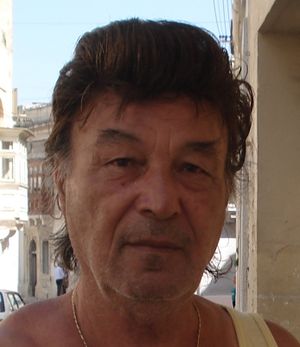Difference between revisions of "Salvu Pace s-Sulari"
| Line 11: | Line 11: | ||
His early days as a folk singer were not remarkable. He recalls being invited to sing at Il-Qajjenza in Birżebbuġa at Il-Bies's shack but was over come by a terrible wave of stagefright. Older folk singers didn't give up on him and guitarist [[Fredu Grech l-Irixx]] (also from Tarxien) egged him on not to give up and give his gift a go. The next time, at il-Belt il-Gdida, at Fredu's bar, he fared well, accompanied by [[Żeppi Meli Ta' Sika]], [[Fredu Abela Il-Bamboċċu]] and [[Ċikku Degiorgio Tal-Fjuri]]. | His early days as a folk singer were not remarkable. He recalls being invited to sing at Il-Qajjenza in Birżebbuġa at Il-Bies's shack but was over come by a terrible wave of stagefright. Older folk singers didn't give up on him and guitarist [[Fredu Grech l-Irixx]] (also from Tarxien) egged him on not to give up and give his gift a go. The next time, at il-Belt il-Gdida, at Fredu's bar, he fared well, accompanied by [[Żeppi Meli Ta' Sika]], [[Fredu Abela Il-Bamboċċu]] and [[Ċikku Degiorgio Tal-Fjuri]]. | ||
Salvu has written four ballads, his favourite being one about the Christ. It is in sixty stanzas and he has performed it on Net Television as well as at the residence of [[Fredu Abela Iż-Żejtuni]]. He also wrote a ballad in remembrance of Leli l-Bugazz, another one about a blind girl. His most favourite ballad is a story about a young boy mutilated to death by his own dogs, which was written by [[Pawlu Seychell Il-Għannej]]. | |||
In the 1990s Pace was also organizing folk singing sessions at the Tarxien Boċċi Club, which he ran, having the best folk singers around for two one-hour improvised verse bouts, that used to attract six hundred people. These sessions were usually recorded by Leli Il-Bugazz. Meanwhile, at the crest of his popularity Pace was invited to folk sing regularly in most Gozitan villages, including schools during the summer recess. His most memorable night was when the subject sung about was about a parrot, featuring also [[Pawlu Seychell Il-Għannej]] and [[Ninu Galea Il-Kalora]]. | In the 1990s Pace was also organizing folk singing sessions at the Tarxien Boċċi Club, which he ran, having the best folk singers around for two one-hour improvised verse bouts, that used to attract six hundred people. These sessions were usually recorded by Leli Il-Bugazz. Meanwhile, at the crest of his popularity Pace was invited to folk sing regularly in most Gozitan villages, including schools during the summer recess. His most memorable night was when the subject sung about was about a parrot, featuring also [[Pawlu Seychell Il-Għannej]] and [[Ninu Galea Il-Kalora]]. | ||
Revision as of 18:44, 31 July 2013
Salvu Pace Is-Sulari
was born on the 2nd February 1947. He hails from Tarxien and was considered as one of the għana stalwarts of the mid-Seventies and Eighties.
There's humour and sarcasm within the Maltese language. The monikers they give to others often mean something totally the opposite of what they really are.
Is-Sulari was nicknamed so because of his diminutive stature, especially when compared to Pawlu Degabriele Il-Bies and Żeppi Meli Ta' Sika. Sulari literally translates for 'storeys'.
As a ten year old, Salvu used to spend time in the fields of Tal-Bajjad, nowadays the village of Santa Luċija, together with his shepherd friend tending goats. Here is where he practiced his first lines.
He grew up in the folk music environment, tailing his maternal uncle is Leli Azzopardi Il-Bugazz to events all over Malta, but mostly at Lucy Casha's outlet in Il-Belt il-Ġdida, Ġolin Axisa Ta' Kostanza, Fredu Abela Il-Bamboċċu's brother in Żabbar and at Karmena tal-Marsa, where Sunday late afternoon sessions were held as soon as the horseraces were over. This exposed him to Żeppi Meli Ta' Sika, Pawlu Seychell Il-Għannej and Salvu Darmanin Ir-Ruġel. The latter is his favourite folksinger, due to his lyrical content.
His early days as a folk singer were not remarkable. He recalls being invited to sing at Il-Qajjenza in Birżebbuġa at Il-Bies's shack but was over come by a terrible wave of stagefright. Older folk singers didn't give up on him and guitarist Fredu Grech l-Irixx (also from Tarxien) egged him on not to give up and give his gift a go. The next time, at il-Belt il-Gdida, at Fredu's bar, he fared well, accompanied by Żeppi Meli Ta' Sika, Fredu Abela Il-Bamboċċu and Ċikku Degiorgio Tal-Fjuri.
Salvu has written four ballads, his favourite being one about the Christ. It is in sixty stanzas and he has performed it on Net Television as well as at the residence of Fredu Abela Iż-Żejtuni. He also wrote a ballad in remembrance of Leli l-Bugazz, another one about a blind girl. His most favourite ballad is a story about a young boy mutilated to death by his own dogs, which was written by Pawlu Seychell Il-Għannej.
In the 1990s Pace was also organizing folk singing sessions at the Tarxien Boċċi Club, which he ran, having the best folk singers around for two one-hour improvised verse bouts, that used to attract six hundred people. These sessions were usually recorded by Leli Il-Bugazz. Meanwhile, at the crest of his popularity Pace was invited to folk sing regularly in most Gozitan villages, including schools during the summer recess. His most memorable night was when the subject sung about was about a parrot, featuring also Pawlu Seychell Il-Għannej and Ninu Galea Il-Kalora.
Is-Sulari has also visited Sydney and Melbourne twice, through an invitation by Lorry Galea. During the first visit he was joined by Pawlu Seychell Il-Għannejand Fredu Abela Iż-Żejtuni, the second with Mikiel Cutajar Is-Superstar.
After forty years of folk singing, Pace's voice has faltered and he has now retired, even though he still yearns for those folk singing sessions.
